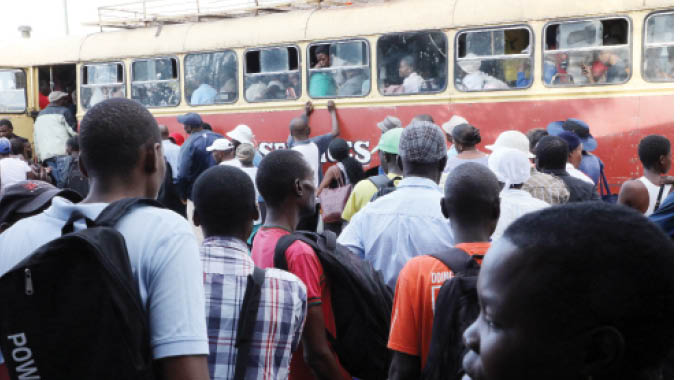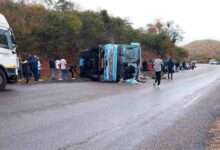Public Transport Social Distancing Fails

Public transport operators have largely failed to effect social distancing, one of the tools necessary to prevent infection in the face of the Covid-19 threat.
It was business, as usual, yesterday as people, men and women alike threw caution to the wind and did nothing to avoid physical contact.
Zimbabwe United Passenger Company (Zupco) Chief Executive Officer, Mr Everisto Madangwa, said as a way of practising social distancing, buses will not carry more than 100 passengers and must not have more than 16 standing passengers.
He urged passengers to warm up to the idea of using the tap card to avoid an exchange of cash on the buses.
“We are now strictly limiting our buses to have a standing capacity of sixteen passengers with effect from the date the President made a public announcement banning gatherings of more than a hundred people. We will not be allowing people to stand from the back up to the door like they used to. This is to ensure that there is enough aeration in the buses,” said Mr Madangwa.
However, a Chronicle news crew observed in the city yesterday that bus crews were still packing people like sardines, with over 40 people standing in most buses.
There was human contact raising the potential of the spread of Covid-19 infections in the event of any positive cases being reported.
Some passengers did bring up the issue of social distancing, but crew members were quick to tell them to disembark and allow “serious” commuters to board.
In an interview yesterday, Dr Rudo Gwini, a specialist physician at Mpilo Central Hospital and Dean of Faculty of Medicine at the National University of Science and Technology, said public transport poses a high risk of spreading the coronavirus.
She said the initiative by Zupco to limit the number of standing passengers is not effective in the face of Covid-19 if other passengers remain seated in threes.
“The danger is really there in public transport due to lack of social distancing between passengers. Also when people cough in their hands they touch the rails which other people will touch and there is no time to wash hands. Therefore, the risk of spreading coronavirus is high. This is the reason why in other countries they have banned public transport to minimize the risk of transmission of the disease,” said Dr Gwini.
“We should understand that these buses were not meant for this disease so I don’t think limiting standing passengers will solve this problem. What happens to those remaining seated in threes next to each other? Though at the moment I don’t have an immediate solution, we need to sit down and come up with an effective strategy because at the moment in Bulawayo I don’t see social distancing being practised.”
In an interview, a Bulawayo resident Mr Wellington Ndlovu, who was waiting for a bus to Emakhandeni suburb in the city, said people were scared of the possibility of Covid-19 transmission in buses but they had no choice.
 “We are of course riding in fear of coronavirus infection but we need the transport to go home,” said Mr Ndlovu.
“We are of course riding in fear of coronavirus infection but we need the transport to go home,” said Mr Ndlovu.
Some passengers urged Zupco to provide sanitizers to reduce the risk of infection.
“The Zupco buses should now at least have sanitizers for the passengers so that we minimize the risk because the way we will be packed inside is dangerous,” said Shamiso Ndlovu who was waiting for a bus to Cowdray Park.
In Interview, Bulawayo police spokesperson Inspector Abednico Ncube said buses must have a maximum of 25 passengers.
“In terms of the traffic regulations, all buses plying local routes within the city are allowed to have a maximum of 25 passengers standing. However, for those on the highway routes there are not allowed to have standing passengers at all,” said Insp Ncube.
Last week, the parliamentary portfolio committee on health Chairperson, Dr Ruth Labode said Government must find a way to ensure that there was enough social distancing in Zupco buses to curb a possible threat of people infecting each other in the often-overloaded buses.
“We understand that people have no money and this scheme is really serving the masses, but we are talking of a potential disaster and these Zupcos are carrying way over 100 people at a time.
“There is overcrowding and way too much human contact. Something must be done, and something must be done faster, otherwise, this Zupco scheme will be the death of us all,” she said.
Meanwhile, Tshova Mubaiwa Transport Cooperative spokesperson Mr Atlas Moyo said the taxi association was sanitating its fleet daily and had put washbasins for their crew and also distributed sanitisers.
The Chronicle


























